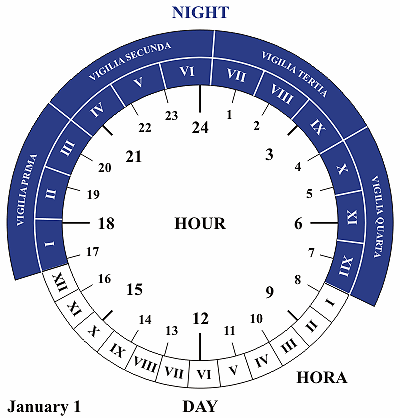Was the transition point between calendar days (in the gregorian\julian calendar), always been at midnight?
If not, when did the midnight rule begin?
And what was the determining time before that? The sunrise?
Was the transition point between calendar days (in the gregorian\julian calendar), always been at midnight?
If not, when did the midnight rule begin?
And what was the determining time before that? The sunrise?
It wasn't simple to track time at night until the invention of mechanical clocks. Before that the breakpoint between days was sunrise (early Roman), solar midnight (later Roman), or sunset (Athenians, Jews) depending on the area and period.
Also worth noting is that until mechanical clocks the length of hours would also vary from a day to the next, and time at night wasn't always counted the same way as during the day. The Roman time table that follows, for instance, highlights how days were split in 12 like today, while nights were split in 4 segments in practice - the latter corresponding to guard shifts.

There are things called Nautical time and astronomical day, with Wikipedia entries describing them, where the day begins at noon. Presumably this was useful in specialized trades (ship driving, star gazing) at various times in history. The Nautical time entry in Wikipedia has this funny bit:
Up to late 1805 the Royal Navy used three days: nautical, civil (or "natural"), and astronomical. A nautical day entered in a ship's log as 10 July, for example, in fact commenced at noon on 9 July civil reckoning, PM therefore coming before AM. The astronomical day of 10 July, on the other hand, commenced at noon of 10 July civil reckoning, and ended at noon on 11 July. The astronomical day was brought into use following the introduction of the Nautical Almanac in 1767, and the British Admiralty issued an order ending the use of the nautical day on 11 October 1805. The US did not follow suit until 1848, while many foreign vessels carried on using it until the 1880s.
The US Navy Observatory's History of the Nautical Almanac says that in 1925 the astronomical day was redefined to begin at midnight. According to this professional astronomical journal article the switch-over was scheduled for 1 Jan 1925.